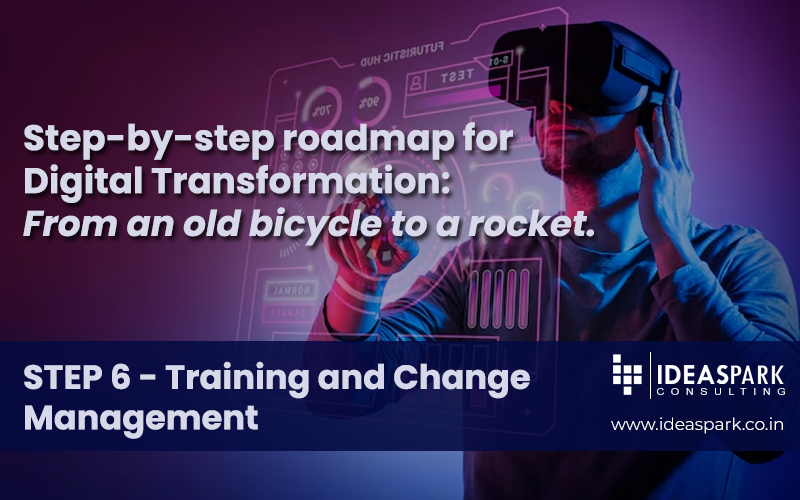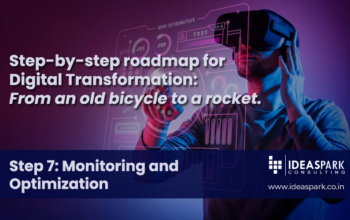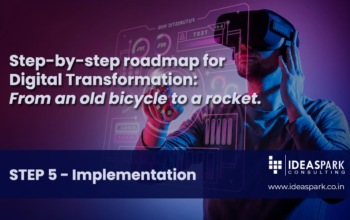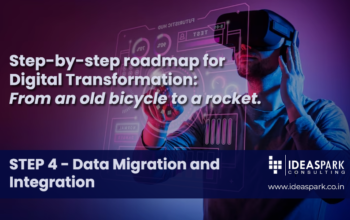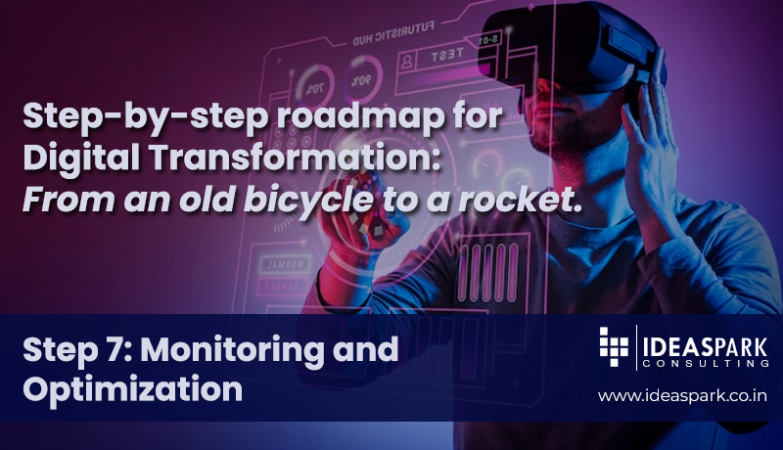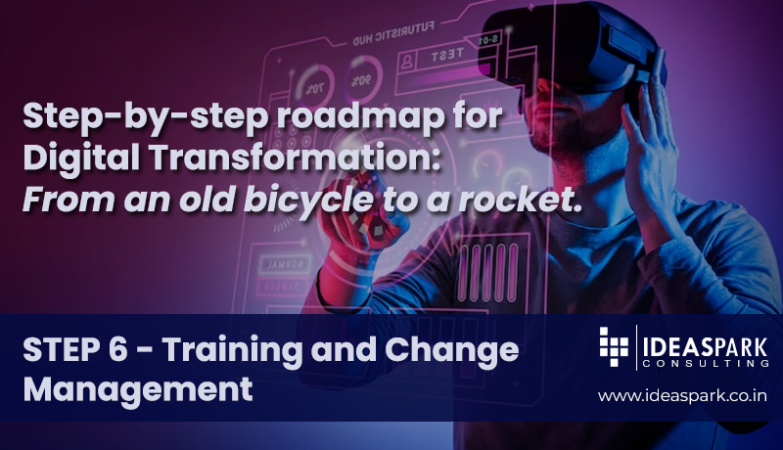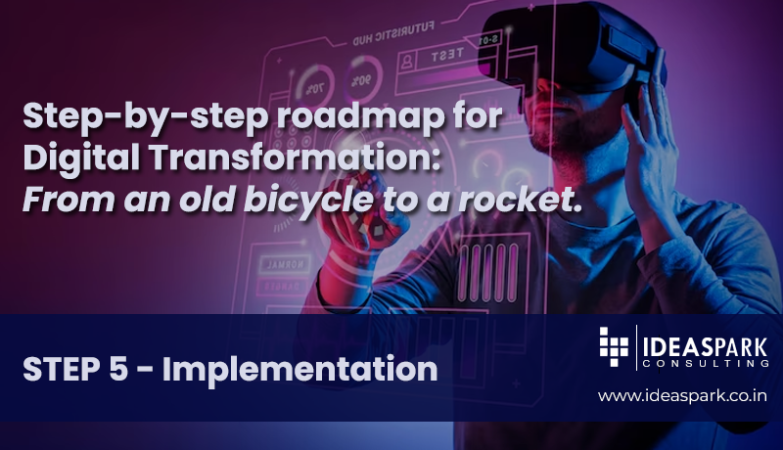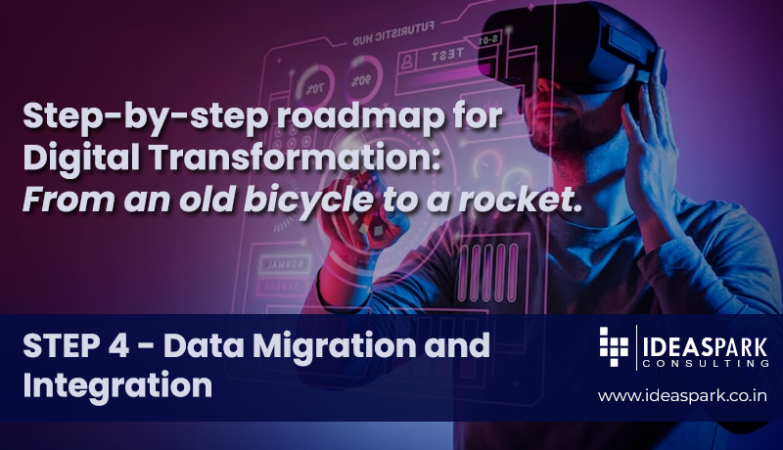In our earlier conversation, we delved into the concept of “Digital Transformation and its initial steps,” and the second step, “Set Clear Objectives.” We have also discussed about he Step 3- “Technology Selection” too. We discussed about Data Migration and Integration as the Step 4 as well. In the Step 5 we have discussed Implementation
If you haven’t had the opportunity to review it yet, please take a moment to explore the respective links provided.
In the dynamic realm of today’s digital era, businesses face the imperative to evolve or face obsolescence. Digital transformation transcends mere industry buzz; it stands as a strategic necessity for organizations poised to flourish in this age of innovation. Analogous to upgrading from a conventional bicycle to a cutting-edge rocket, undertaking a digital transformation journey demands meticulous planning and precise execution. In this comprehensive examination, we delve into step six of the roadmap: Implementation – the pivotal phase where selected technologies and processes are put into action.
Step 6: Training and Change Management
Training and change management are fundamental pillars of successful digital transformation initiatives. This phase focuses on preparing employees to embrace and effectively utilize the new technologies, tools, and processes introduced during the transformation journey. Here’s a deeper dive into the key aspects of training and change management:
Comprehensive Training Programs:
- Organizations design and implement comprehensive training programs tailored to the specific needs of different departments, teams, and individual roles.
- These programs aim to equip employees with the knowledge, skills, and competencies required to leverage the new technologies and processes effectively.
- Training methods may include workshops, seminars, webinars, e-learning modules, hands-on sessions, and peer learning opportunities.
- Training content covers not only technical aspects but also focuses on understanding the rationale behind the transformation, its benefits, and its impact on day-to-day operations.
Cultural Transformation:
- Digital transformation often requires a cultural shift within the organization, moving towards a more agile, innovative, and collaborative work environment.
- Change management strategies are employed to foster a culture of openness, adaptability, and continuous learning.
- Leadership plays a crucial role in championing the change, setting the tone for cultural transformation, and leading by example.
- Communication channels are established to facilitate transparent communication and encourage employee engagement in the transformation process.
Addressing Resistance and Overcoming Challenges:
- Resistance to change is common and can stem from factors such as fear of the unknown, perceived threats to job security, or discomfort with new technologies.
- Change management efforts focus on identifying and addressing sources of resistance through active listening, empathy, and addressing concerns proactively.
- Strategies for overcoming resistance may include providing clear explanations of the benefits of the transformation, offering support and resources for skill development, and involving employees in decision-making processes.
Continuous Support and Reinforcement:
- Change doesn’t happen overnight, and ongoing support is crucial for ensuring sustained adoption and success.
- Organizations provide continuous support, guidance, and resources to employees as they navigate through the changes brought about by digital transformation.
- Feedback mechanisms are established to gather insights from employees, identify areas for improvement, and address challenges in real-time.
- Regular check-ins, progress reviews, and recognition of achievements help reinforce positive behaviors and motivate employees to stay engaged in the transformation journey.
Empowering Employees as Change Agents:
- Employees are encouraged to become advocates and ambassadors for change, empowering them to drive positive transformational outcomes within their teams and departments.
- Opportunities for collaboration, knowledge sharing, and cross-functional teamwork are leveraged to foster a sense of ownership and accountability among employees.
- Recognition programs, rewards, and incentives may be implemented to acknowledge and celebrate individuals and teams who demonstrate exceptional commitment and contribution to the transformation effort.
In essence, effective training and change management are essential for facilitating a smooth transition and maximizing the benefits of digital transformation. By investing in employee development, fostering a supportive culture, and addressing resistance proactively, organizations can pave the way for sustainable growth, innovation, and success in the digital era.
For a FREE assessment, connect with our Sales department at [email protected] or WhatsApp 91-8904207147.
Moving forward in the Digital Transformation process, the upcoming focus will be on Monitoring and Optimization —a topic that we’ll explore in the next segment.
DigitalTransformation, BusinessInnovation, TechUpgrade, EfficiencyJourney, StrategicChange, ProcessImprovement, InnovationDrive, TechEvolution, DigitalStrategy, BusinessTransformation, ChangeManagement, FutureOfWork, AdaptiveTech, EvolvingBusiness, TechIntegration, Modernization, DigitalAdvancement, InnovateOrStagnate, BusinessEfficiency, TechRevolution, AgileBusiness, DigitalInnovation, TransformativeTech, StrategicPlanning, OptimizeProcesses, TechLeadership, EfficientOperations, BusinessGrowth, AdaptAndThrive, FutureReadyBusiness
#DigitalTransformation #BusinessInnovation #TechUpgrade #EfficiencyJourney #StrategicChange #ProcessImprovement #InnovationDrive #TechEvolution #DigitalStrategy #BusinessTransformation #ChangeManagement #FutureOfWork #AdaptiveTech #EvolvingBusiness #TechIntegration #Modernization #DigitalAdvancement #InnovateOrStagnate #BusinessEfficiency #TechRevolution #AgileBusiness #DigitalInnovation #TransformativeTech #StrategicPlanning #OptimizeProcesses #TechLeadership #EfficientOperations #BusinessGrowth #AdaptAndThrive #FutureReadyBusiness #DataMigration #DataIntegration #DigitalTransformation #DataManagement #DataQuality #DataStrategy #ITIntegration #CloudMigration #LegacySystems #DataMapping #DataCleansing #ETLProcess #SystemIntegration #DataOps #TechMigration #DigitalStrategy #DataArchitecture #BusinessIntegration #Modernization #DataFlow
Embark on a digital transformation adventure, akin to a road trip. Evaluate current processes, pinpoint areas for improvement, strategize upgrades, and execute changes to navigate an efficient business route.

